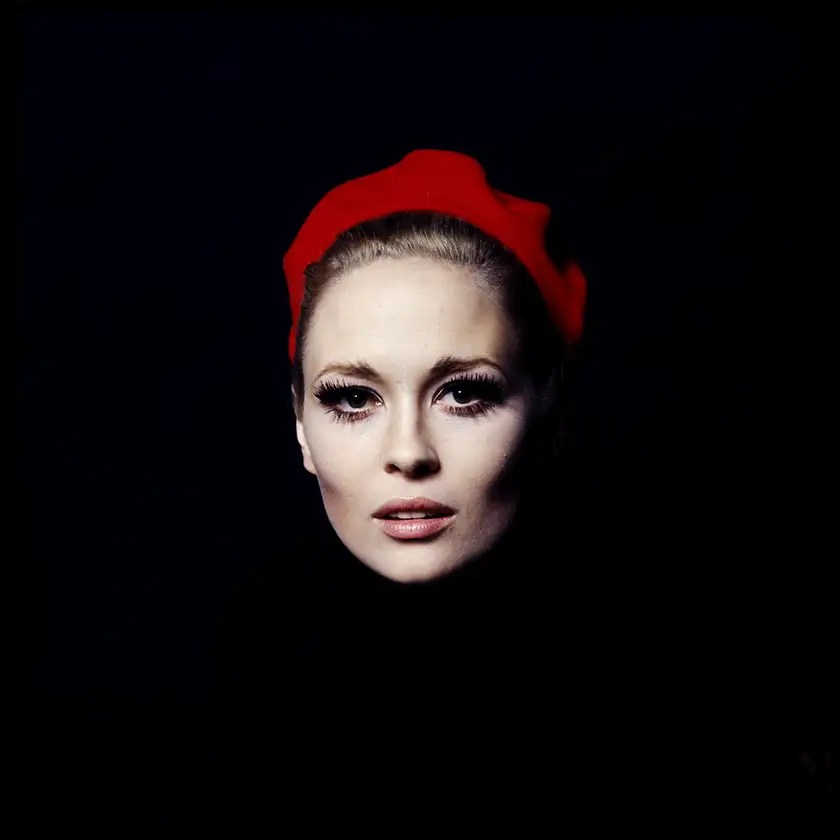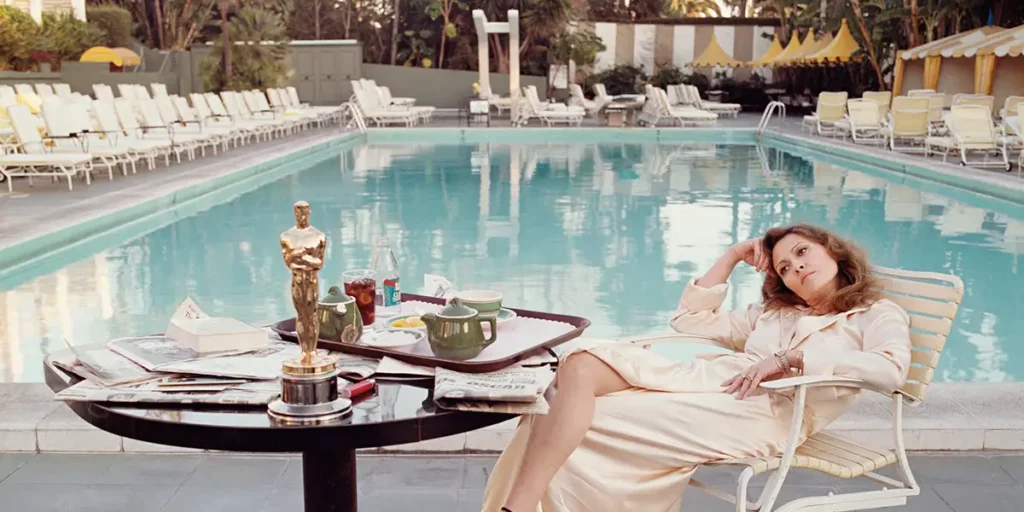In the HBO documentary Faye, Laurent Bouzereau takes on the arduous task of getting to the core of acclaimed actress Faye Dunaway, unmasking the woman under all that star power.
Director: Laurent Bouzereau
Genre: Documentary
Run Time: 91′
US Release: July 13, 2024 on HBO and Max
UK Release: TBA
Laurent Bouzereau does not have an easy task in telling the life story of Faye Dunaway in the HBO Original documentary Faye, which he produced and directed. From the opening shot of the film, in which he sits down with Faye to conduct the interviews where the actress would open up about her very historied life, she immediately lets Bouzereau know exactly how she wants to be shot.
She asks about her positioning in the frame, if the lighting looks alright, and lets her director know she is ready to begin filming. Throughout her decades-long career, Faye has been painted as a difficult person to work with. It seems the goal of this documentary is to distinguish not only how this star was born, but also what about her very public life is true and what are mere fabrications that have been taken on a life of their own over the years.
Faye Dunaway is a pillar of ‘70s filmmaking. Her first big break was playing Bonnie in Bonnie and Clyde opposite Warren Beatty. Her career continued to collect acclaim as she went on to star in other legendary films such as Chinatown, Network and Mommy Dearest. However, Faye’s fight to the top of Hollywood was fraught with hardship. She was a woman in a man’s world who fought for her right to stand amongst the best and have her opinion count. Her whole life she sought out freedom through the path of success and truly refused to take anything less than what she deserved. Getting to the root of Faye is the challenge of this film, but it is one Bouzereau takes on with grace and respect for the walls Ms. Dunaway has put up around herself.
Dorothy Faye Dunaway, a young woman born in Florida metamorphosed into an international movie star. Faye tells the life story of Faye Dunaway with the acclaimed actress at the center of the film from her perspective. The movie opens on Faye sitting on a couch, being shown photos from different stages of her life by her son Liam. It is a clean, straightforward approach to recounting a grand story of a woman who has completely reinvented herself time and time again.

As a young girl, Faye’s mother forced her father into military service in an attempt to straighten out his issues with alcohol. Faye became an army brat, traveling all over and settling down for only two years at a time. She had big dreams of a life as an actress and found a real solace in performing that she wasn’t able to find in the turbulent reality she lived in. She followed her dreams to the stage, spending three years in New York before being cast in her first major film, Hurry Sundown. Faye’s career took off immediately, as she proved to be a true force of nature in Hollywood. Faye unveils the strength, vulnerability and bravado that launched an unknown army brat into one of the biggest stars in the world.
Faye gives grace to a woman who has lived a very full, but far more notably, very public life. Bouzereau doesn’t push her into uncomfortable territory or force her to talk about the dark stains on her public image; he lets her come to those conversations on her own accord. It’s clear, through the existing mythology around Faye Dunaway, that many others have done that for her. Whether it be the various tabloid articles that emerged calling her a horror to have on set or Bette Davis sitting down on Carson Daily’s late-night talk show calling her one of the worst people she knows in Hollywood, Faye’s public image has never been something she has had much say over.
Throughout the film, Faye tells the camera of her life’s greatest hardships in comments that come across as almost throwaway lines. Whether it be her father’s struggles with alcoholism or her diagnosis of bipolar and manic depression, even when she’s opening up you can see Faye is closed off. Although Faye confesses to having struggled with mental health related issues the entirety of her life, the primer of her career was not a time very forgiving of these struggles nor knowledgeable about them. Bouzereau works to ease her into talking about the dark times in her life by having her son Liam there with her, as she contemplates how to divulge these parts of her past that have been collecting dust in the back of her mind.
Oftentimes, Bouzereau lets Faye herself navigate how she’d like to tell her story. While this doesn’t do much to embolden the structure of the documentary, it makes its subject far more comfortable in diving into her past. There is a sense throughout the documentary that Faye hasn’t been able to have much control over how others see her, regardless of how hard she might try.
The documentary allows her to have the sense of control that she has always desired over the way her story is being told. There is a real sense that Bouzereau structures the film this way because it is the only way she will truly feel free to open up. Faye does not shy away from talking about the ugliest parts of her past. She acknowledges her faults, missteps and miscalculations. Sure, we are looking at the life of one of the most legendary actresses in film history, but at the same time, a woman who has lived a life that has been, at times, incredibly exciting, but also devastating.
Due to the raw, and at times seemingly lackadaisical, format of the movie, its pacing feels inconsistent. While the audience gets a look at the woman behind the icon, there’s a certain patience needed to sit through Faye’s life story. In allowing her to guide the film, the end result feels like a one on one conversation with Faye that often goes into tangents and details that you would not get in a more head on filmmaking approach. While this adds color to the story, it distracts from it being a compelling narrative structure. This is the type of project that couldn’t have been made without Faye’s full trust in Bouzereau, and while at times it is clear she is skeptical of opening up, it’s evident she does want to but is still trying to figure out how.
For so long, Faye has had to come to terms with who she really is versus how the public perceives her. She talks at length about the two women that live inside her, one the famed movie star and the other an army brat who had a driving goal but no real sense of self. Once she was launched into the public eye she had to come to terms with her mental health struggles that made her act erratically on set. The people who worked with her labeled her difficult, but in all actuality lacked the vocabulary and knowledge to understand who Faye really was and what drove her behavior.
She’s a woman who lost control of her narrative as her star began to rise and has been trying to grapple with what is worth setting the record straight on ever since. While Hollywood labeled Faye as “difficult” and “temperamental”, Bouzereau makes it the mission of the film to give context to the reasoning behind why she is the way she is. Faye was a young girl plucked from obscurity and made to stand on her own two feet in an industry that repeatedly tried to tear her down the way it tries to tear most strong, successful women down. Faye’s greatest sin seems to be knowing what she wants and doing what she needed to in order to get it.
Faye is a sensitive character study on an acting legend. While Bouzereau’s decision-making feels safe, and even at times dull, there is an understanding after getting to the core of who Faye Dunaway is as to why. From a young age, Faye determined the only way to be truly free was to be successful. She fought tooth and claw for the good things that came her way. The only major consistency she has ever known has been her love of acting. It is the one thing in her life that has never changed, the one thing that she can always resort back to in order to find her sense of self time and time again.
Faye had its World Premiere at the 2024 Cannes Film Festival. The documentary will air on HBO on July 13, 2024 at 8:00 p.m. ET/PT, and will be available to stream on Max. Read our review of bluish!

